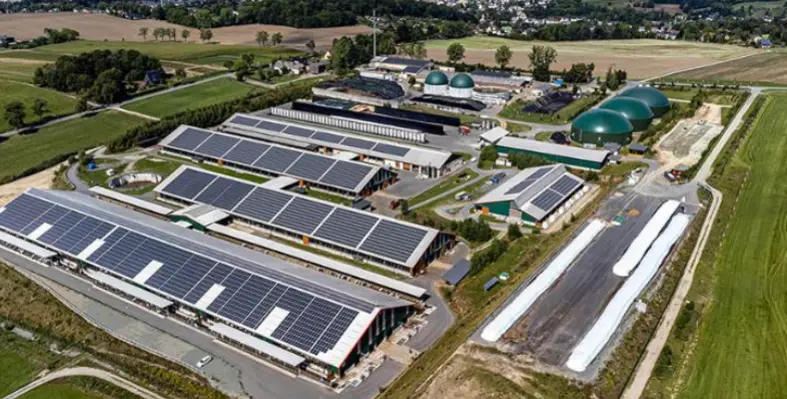Agrar GmbH Reichenbach recently launched its Kumac digestate processing system, a first in Germany, commissioned from WELTEC BIOPOWER. The agricultural firm, based in Saxony's Vogtland region, specialises in dairy farming and feed crop cultivation
Alongside their biogas plant, operational since 2006 with an 845 kW electrical output, they generate up to 72,000 tons of liquid manure and digestate annually.
The biogas plant supplies 12,000 kWh of electricity daily to the grid and up to 500 kW of heat to local consumers and the former Paracelsus Clinic in Reichenbach.
Their primary business involves delivering biogas to Stadtwerke Reichenbach's heating plant, equivalent to the yearly power needs of around 6,000 households.
Deutsche Biomasseforschungszentrum gemeinnützige GmbH (DBFZ) showcased Agrar Reichenbach's innovative Kumac system during the Leipzig Biogas Expert Talks in December 2023.
The Kumac process efficiently converts liquid manure into compost, fertiliser, bedding, or biogas substrate, reducing nutrient waste. Around 25% solid and 20% liquid farm manure, along with 55% dischargeable water, are produced by the Kumac process in Reichenbach.
Managing director of Agrar, Lars Bittermann said, "This closes an efficient material flow cycle, and the individual areas of our portfolio interlock perfectly."
Flocculants are used to separate fine components from the source material, reducing odours and facilitating nutrient recycling. The resulting solid material, with a dry matter content of up to 30%, is utilised directly as fertiliser, compost, bedding, or biogas substrate.
Liquid manure processing system: efficient and scalable
A newly implemented liquid manure processing system is revolutionising nutrient recycling, reducing waste volume, and providing eco-friendly fertilisers.
After separation of solid particles, a three-stage reverse osmosis process removes salts and nutrients, yielding liquid fertiliser rich in nitrogen, now only a quarter of its original volume. The majority of the treatment product, clear water, is currently being discharged.
With support from the European Agricultural Fund for Rural Development, the scalable modular system can handle a minimum of 70,000 tons of liquid manure or digestate yearly.
Bittermann also highlights the system's nearly full automation, minimising required personnel.
Additionally, Nico Sudbrink, the process engineer at WELTEC BIOPOWER, notes that operators can receive funding incentives from the European Agricultural Fund for Rural Development.








